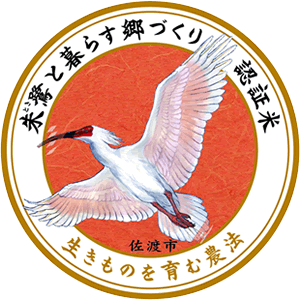The Japanese crested ibis is the bird symbol of Niigata Prefecture. This plains and wetland bird came close to extinction at the turn of the millennium.
Sado Island is one of the few places in Japan visited by Japanese crested ibis, Toki in Japanese.
In 2011, the islanders undertook initiatives to promote biodiversity in their rice fields inhabited by fauna (groupers, frogs, crayfish, etc.) which the ibis feast on.
Agriculture that feeds living beings is an agricultural method that not only reduces pesticides and chemical fertilizers, but also creates habitat for living beings in and around paddy fields. It allows animals such as fish, insects and riparian plants to survive despite human activities.
The result is a rich ecosystem in which birds, such as herons and ibises, can feed.
The agricultural lands and their surroundings have been developed into an environment welcoming several species, including ibis.
When it is necessary to drain the water from the paddy to dry the rice, the water is poured into ponds in the periphery where the fauna of the rice fields can escape and live.
Passages are installed so that fish and other creatures can move freely between rice fields and streams.
In winter, the rice fields remain flooded so that the living creatures can survive.
Plots are left fallow and flooded for a year to obtain an environment rich in living beings.
Plots are left fallow and flooded for a year to obtain an environment rich in living beings. These initiatives have enabled the island to be granted GIAHS Certification (Globally Important Agricultural Heritage System) from the FAO.

Sado rice is ranked year after year one of the best in Niigata and Japan.
The town of Sado has created a Toki to Kurasu, “Living with Toki” certification seal awarded to rice grown under the conservation program. Part of the profits is donated to the Ibis Conservation Fund in the city of Sado.
The Obata brewery, maker of Manotsuru sake, is working with the farmers of Sado on a more ecological development of agricultural land.
The rice fields are fattened by running irrigation water through the Sado oyster shells.
From this collaboration was born the delicious Manotsuru Junmai Ginjo Toki to Kurasu. In addition to being ecologically virtuous, this lively, mineral and refreshing sake, made with top quality Koshitanrei rice, offers light aromas of fennel and mint as well as flavors of anise, almond and tangerines.





